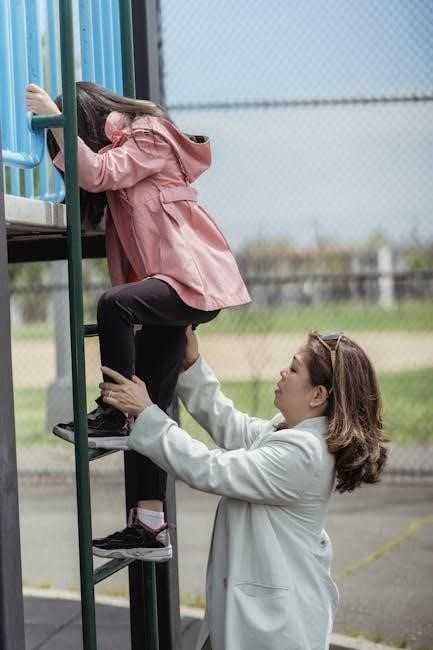Welcome to our comprehensive guide parenting resource, offering expert tips and strategies for every stage. Embrace the parenting journey with love, patience, and effective guidance to nurture your child’s growth and happiness.
Understanding the Basics of Parenting
Parenting is a multifaceted role that involves providing care, guidance, and support to help children grow into capable individuals. It requires balancing love, discipline, and patience to create a nurturing environment. Effective parenting starts with understanding a child’s developmental needs, role-modeling positive behaviors, and fostering open communication. By setting clear expectations and encouraging independence, parents help children build confidence and thrive in life. Consistency, empathy, and adaptability are key to navigating the challenges of raising a child.
Importance of Positive Parenting
Positive parenting fosters emotional growth, resilience, and strong parent-child relationships. By focusing on encouragement, active communication, and consistent discipline, parents help children develop self-esteem and social skills. This approach reduces behavioral issues and promotes a supportive environment where kids feel valued. It lays a foundation for lifelong confidence and healthy relationships, making it essential for a child’s overall development and well-being.
Safety Tips for Parents
Safety is crucial for protecting children from harm. Secure home environments, supervise activities, and teach basic safety habits. Ensure awareness of potential risks and prepare for emergencies.
Creating a Safe Home Environment
Creating a safe home environment is vital for child protection. Secure heavy furniture, install safety gates, and store hazardous materials out of reach. Regularly check for potential hazards like loose wires or sharp objects. Ensure all windows and doors have secure locks, and keep emergency numbers accessible. Teach children about basic safety rules and conduct frequent safety drills to prepare them for unexpected situations.
Outdoor Safety Precautions
Ensuring outdoor safety is crucial for children’s well-being. Always supervise kids during outdoor activities and teach them to stay within designated areas. Secure playground equipment and check for hazards like sharp objects or toxic plants. Dress children in visible clothing and apply sunscreen. Teach traffic awareness and ensure they understand the importance of staying away from strangers while outdoors. Regularly inspect outdoor play areas for safety.

Emotional Guidance for Children
Emotional guidance helps children understand and manage their feelings. Parents should offer support, teach empathy, and provide tools for self-expression to foster lifelong emotional well-being.
Building Self-Esteem in Kids
Building self-esteem in children involves praising their efforts, encouraging independence, and celebrating achievements. Focus on their strengths, teach problem-solving skills, and provide a supportive environment. Positive reinforcement helps children develop confidence and resilience. Encourage them to express their feelings and thoughts, fostering a sense of worth and capability. This foundation supports their emotional and social growth, helping them navigate challenges with confidence and positivity.
Teaching Emotional Regulation
Teach children to recognize and manage emotions by labeling feelings and encouraging open conversations. Model healthy emotional responses and teach calming techniques like deep breathing. Provide a safe space for expression and guide problem-solving for emotional challenges. Consistent support helps children develop self-awareness and coping skills, fostering emotional resilience and stability as they grow.
Discipline Techniques
Effective discipline involves consistency, positive reinforcement, and clear communication. Focus on teaching right from wrong while fostering respect and responsibility, guiding children toward self-control and accountability.
Setting Boundaries and Limits
Setting clear boundaries helps children understand expectations and develop self-discipline. Consistently enforce age-appropriate rules with fair consequences, ensuring they align with your child’s developmental stage. Communicate limits calmly and explain the reasoning to foster understanding and cooperation. Flexibility is key, but consistency reinforces trust and security, teaching children to respect rules and take responsibility for their actions. This builds a foundation for lifelong decision-making skills.
Positive Reinforcement Strategies
Positive reinforcement is a powerful tool to encourage good behavior in children. Use genuine praise to acknowledge achievements, focusing on effort rather than just results. Celebrate small successes with smiles, hugs, or verbal affirmations like, “I’m proud of you!” Offer tangible rewards, such as stickers or stars, to motivate consistency. This approach fosters self-esteem, encouraging children to repeat positive actions and develop a growth mindset. Be specific and sincere to ensure authenticity.

Effective Communication
Effective communication is the cornerstone of strong parent-child relationships. Active listening and open dialogue foster trust, understanding, and emotional connection, helping children feel heard and valued.
Active Listening and Open Conversations
Active listening involves fully engaging with your child, maintaining eye contact, and showing genuine interest. Encourage open conversations by asking open-ended questions and validating their feelings. Avoid interrupting and offer a non-judgmental space for them to express themselves. This fosters trust, emotional connection, and helps children develop effective communication skills. It also teaches them to articulate thoughts clearly and resolve conflicts constructively.
Encouraging Honest Dialogue
Creating an environment where your child feels safe to express their thoughts is essential. Be approachable, ask open-ended questions, and avoid being overly critical. Acknowledge their feelings and experiences, even when difficult. This fosters trust and encourages transparency. Praise honesty, even if it’s challenging, to build a foundation of open communication and mutual respect. Consistency and patience are key to nurturing this dialogue.

Supporting Educational Development
Foster curiosity and a love for learning by creating a nurturing environment. Provide educational resources, encourage exploration, and engage in your child’s academic journey actively. Support their interests and collaborate with teachers to ensure well-rounded development. This approach helps build a strong foundation for lifelong learning and intellectual growth. Consistency and encouragement are key. Stay involved and celebrate progress.
Fostering a Love for Reading
Encourage a lifelong passion for reading by creating a cozy, book-friendly environment. Read aloud daily, discuss stories, and let your child choose books that spark their interest. Make reading a family activity and celebrate their progress. This nurtures imagination, improves vocabulary, and lays the groundwork for future academic success. Consistency and enthusiasm are key to fostering a deep love for reading.
Helping with Homework and Learning
Support your child’s academic growth by creating a positive study environment. Encourage independence but offer guidance when needed. Break tasks into smaller steps to reduce overwhelm. Ask open-ended questions to foster critical thinking. Celebrate progress, no matter how small, to build confidence. Stay connected with teachers to align your support with classroom goals. Consistency and patience are key to nurturing lifelong learning skills.

Health and Wellness
Prioritize your child’s health and wellness for optimal development. Encourage regular physical activity, balanced nutrition, and sufficient sleep. Model healthy habits and mental well-being to inspire a lifelong commitment to health.
Encouraging Physical Activity
Regular physical activity is essential for children’s health and development. Encourage daily outdoor play, sports, or dance to promote physical fitness and coordination. Limit screen time to inspire movement and exploration. Model an active lifestyle to show the importance of staying physically engaged. This fosters energy levels, mental well-being, and lifelong healthy habits in your child.
Teaching Healthy Eating Habits
Instill healthy eating habits by modeling balanced meals and snacks. Introduce a variety of colorful, nutrient-rich foods to ensure proper growth and development. Encourage mindful eating and portion control. Limit sugary treats and processed foods to promote better choices. Involve children in meal planning and grocery shopping to foster an appreciation for wholesome nutrition and lifelong healthy eating patterns.

Role Modeling
As a parent, you are your child’s first and most influential role model. Consistently demonstrate the values, behavior, and character you wish them to adopt. Your actions shape their identity and guide their interactions, making positive role modeling essential for their development.
Demonstrating Respect and Kindness
Demonstrating Respect and Kindness
Modeling respect and kindness is crucial for teaching children how to treat others. Show empathy, listen actively, and use polite language. Encourage helping others and resolving conflicts peacefully. These actions foster a caring environment and help children develop compassion, understanding, and strong social skills. By consistently demonstrating kindness, you guide them to become respectful and considerate individuals.
Showing Responsibility and Integrity
Modeling responsibility and integrity teaches children the importance of accountability and honesty. Demonstrate commitment by keeping promises and owning up to mistakes. Encourage truthfulness and ethical behavior by leading by example. This helps children develop a strong moral compass, understand consequences, and build trust. Consistently practicing these values fosters a sense of duty and fairness in your child’s character development.
Building Family Bonds
Nurturing togetherness and trust through shared activities, open communication, and creating lasting memories fosters strong family bonds and a supportive environment for children to thrive.
Scheduling Quality Time
Planning regular family activities ensures consistent bonding and strengthens relationships. Set aside device-free moments daily, engaging in hobbies or conversations. Consistency helps children feel secure, fostering trust and creating lasting memories. Involve kids in planning to teach responsibility and excitement for shared experiences, making quality time meaningful and enjoyable for all family members.
Creating Fun Family Traditions
Creating fun family traditions helps build strong bonds and lasting memories. Whether it’s a weekly dinner, holiday rituals, or special outings, these activities provide a sense of stability and belonging for children. Traditions also offer opportunities to teach values and cultural heritage, fostering a deeper connection within the family. As your family grows, traditions can evolve to remain meaningful and engaging for everyone.

Teaching Responsibility
Teaching responsibility helps children develop essential life skills, accountability, and empathy. It fosters independence, self-discipline, and a sense of duty, preparing them for future challenges and relationships.
Assigning Age-Appropriate Chores
Assigning chores based on a child’s age and ability helps them understand responsibility and contribute to the household. For younger kids, simple tasks like picking up toys or setting the table work well. Older children can handle more complex duties, such as loading the dishwasher or mowing the lawn; This fosters a sense of ownership and prepares them for independence while teaching teamwork and accountability from an early age.
Encouraging Volunteer Work
Encouraging children to volunteer fosters empathy, social skills, and a sense of community responsibility. Parents can guide kids in finding age-appropriate volunteer opportunities, such as helping at food banks or participating in local clean-up events. This exposure teaches compassion and the value of giving back, while also building confidence and a stronger connection to their community from a young age.

Fostering Independence
Encourage children to take ownership of tasks and decisions, fostering self-reliance and confidence. Teach problem-solving skills and allow them to handle age-appropriate responsibilities independently.
Encouraging Self-Reliance
Encourage children to think independently and take ownership of their actions. Provide opportunities for them to make decisions, such as choosing outfits or activities, and allow them to complete tasks independently. Praise their efforts and guide them through challenges without taking over. This fosters accountability and builds confidence, helping them develop the skills needed for lifelong independence.
Teaching Problem-Solving Skills
Teach children to approach problems methodically by identifying the issue, brainstorming solutions, and evaluating outcomes. Encourage them to implement their chosen plan and reflect on the results. Positive reinforcement for their efforts fosters resilience and adaptability. Guide them to learn from failures and view challenges as growth opportunities, building their confidence in handling real-world situations.

Cultivating Gratitude
Model gratitude by expressing thanks regularly and encouraging your child to do the same. Foster a daily habit of appreciating small joys and kindness received.
Practicing Daily Gratitude Rituals
Encourage daily gratitude by creating simple rituals, such as sharing three things you’re thankful for during dinner or before bed. Consistency helps develop a positive mindset in children. Teach them to reflect on small joys, like a good meal or a sunny day, fostering appreciation and kindness; This habit nurtures emotional well-being and strengthens family bonds over time.
Teaching Appreciation for Others
Guide your child to value and respect others by acknowledging their efforts and kindness. Encourage them to express gratitude towards family, friends, and community members. Teach active listening and empathy to help them understand others’ feelings. These practices foster a sense of appreciation and respect, essential for building strong, positive relationships throughout their lives.

Managing Screen Time
Help your child balance screen use with physical and creative activities to promote healthy habits and reduce overexposure to digital devices.
Setting Limits on Digital Devices
Establish clear rules for screen time, such as device-free zones and hours. Use parental controls to monitor and restrict usage. Encourage physical activities and hobbies to balance screen time. Set a good example by limiting your own screen use. Teach children the importance of moderation to help them develop healthy digital habits from an early age.
Encouraging Offline Activities
Engage your child in outdoor games, sports, or creative hobbies to reduce screen dependency. Plan family outings, picnics, or visits to parks and museums. Encourage reading, drawing, or building with toys. Foster social connections through group activities or clubs. This helps develop physical, emotional, and social skills while promoting a balanced lifestyle for your child.
Nutrition and Mealtime
Ensure children receive a balanced diet rich in essential nutrients. Promote healthy eating habits by modeling good choices and creating a positive family mealtime environment.
Introducing New Foods
Introducing new foods can be challenging but is crucial for developing diverse eating habits. Start by offering small portions alongside familiar dishes to reduce resistance. Involve children in grocery shopping or cooking to spark curiosity. Consistency is key; repeated exposure increases acceptance. Praise their efforts, even for small tastes, to foster confidence. Patience and positivity create a welcoming environment for exploration.
Creating Healthy Mealtime Habits
Establishing consistent meal routines helps children develop healthy eating patterns. Encourage turning off screens during meals to promote focus and family bonding. Offer balanced meals with varied flavors and textures to broaden their palate. Use fun shapes or colorful plates to make mealtime engaging. Praise their efforts to try new foods and encourage self-serving to foster independence. Patience and positivity nurture lifelong healthy habits.
Community Involvement
Encourage participation in local events and volunteer work to foster social responsibility and empathy, helping children understand the value of giving back to the community.
Participating in Local Activities
Engage your child in local events, such as festivals, sports, or community projects, to build social skills and a sense of belonging. Encourage joining clubs or groups aligned with their interests, fostering teamwork and empathy. Explain how these activities benefit others, teaching the value of collective effort. Modeling participation yourself reinforces its importance, creating a positive impact on their development and community connection.
Teaching Social Responsibility
Instill in your child the importance of contributing to society by modeling compassionate behavior. Encourage volunteering or donating to those in need, and discuss how small actions can make a difference. Teach empathy by talking about others’ feelings and challenges. Involve them in community service, helping them see the direct impact of their efforts, fostering a lifelong commitment to giving back and caring for others.
Parenting is a journey of love, patience, and growth. By fostering a nurturing environment, setting clear boundaries, and modeling positive values, you empower your child to thrive and succeed in life.
Summarizing Key Parenting Strategies
Effective communication, active listening, and open conversations are essential for building trust and understanding. Positive reinforcement encourages positive behavior, while clear boundaries and consistent discipline provide guidance. Emotional support and teaching problem-solving skills empower children to navigate challenges. Role modeling respect, responsibility, and kindness shapes their character. Fostering independence, self-reliance, and a growth mindset helps them thrive in life.
Final Thoughts on Successful Parenting
Successful parenting is about creating a nurturing environment filled with love, patience, and understanding. By being consistent, supportive, and adaptable, parents can help their children grow into confident, compassionate individuals. It’s essential to embrace the journey, celebrate milestones, and learn alongside your child. Remember, parenting is a lifelong commitment that requires effort, but the rewards are immeasurable and transformative for both you and your child.





